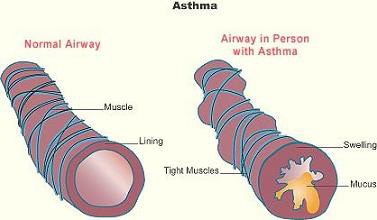Featured Health Support Products
Breathe Well May Offer Support For:
- Healthy Respiration*
- Healthy Lung Function*
- Normal & Healthy Breathing*
- Imbalance Contributing to Asthma, COPD and Coughing* *
Aller Well May Offer Support For:
- Allergies: Seasonal, Animal, Dust & Food*
- Hay fever, Pollen, Inhalant Allergies*
- Hives/Urticaria*
100% Money Back Guarantee!
What Is Asthma?
Asthma (Az-muh) is a chronic disease that affects your airways. The airways are the tubes that carry air in and out of your lungs. If you have asthma, the inside walls of your airways are inflamed (swollen). The inflammation (IN-fla-MAY-shun) makes the airways very sensitive, and they tend to react strongly to things that you are allergic to or find irritating. When the airways react, they get narrower, and less air flows through to your lung tissue. This causes symptoms like wheezing (a whistling sound when you breathe), coughing, chest tightness, and trouble breathing, especially at night and in the early morning.

Is there an Asthma Cure?
Western medication offers no cure for Asthma, but most people with asthma can control it so that they have few and infrequent symptoms and can live active lives. When your asthma symptoms become worse than usual, it is called an asthma episode or attack. During an asthma attack, muscles around the airways tighten up, making the airways narrower so less air flows through. Inflammation increases, and the airways become more swollen and even narrower. Cells in the airways may also make more mucus than usual. This extra mucus also narrows the airways. These changes make it harder to breathe.
What are Asthma Attacks?
Asthma attacks are not all the same; some are worse than others. In a severe asthma attack, the airways can close so much that not enough oxygen gets to vital organs. This condition is a medical emergency. People can die from severe asthma attacks. So, if you have asthma, you should see your doctor regularly. You will need to learn what things cause your asthma symptoms and how to avoid them. Your doctor will also prescribe medicines to keep your asthma under control.
How does one deal with Asthma?
Taking care of your asthma is an important part of your life. Controlling it means working closely with your doctor to learn what to do, staying away from things that bother your airways, taking medicines as directed by your doctor, and monitoring your asthma so that you can respond quickly to signs of an attack. By controlling your asthma every day, you can prevent serious symptoms and take part in all activities.1
If you have asthma, it is very important to control your asthma or you will likely have asthma attacks and miss certain activities. For instance, asthma is one of the main reasons why children miss school. On a dietary level, eating a healthy diet along with effective natural dietary supplementation can give your body the extra health support it needs for maintaining healthy lung function.*
Read More About Healthy Breathing Support...*
1. National Heart Lung and Blood Institute, May 2006
[Top]

 Get Well Natural, LLC
Get Well Natural, LLC  Kidney Function & Regeneration Health
Kidney Function & Regeneration Health  Platelet & Blood Cell Health
Platelet & Blood Cell Health  Prostate, Flow & Function Health
Prostate, Flow & Function Health  General Mind & Body Health
General Mind & Body Health  Heart, Cholesterol & Cardio Health
Heart, Cholesterol & Cardio Health  Allergy-Free Body
Allergy-Free Body  Anxiety & Stress
Anxiety & Stress  Blood Platelet Counts & Function
Blood Platelet Counts & Function  Blood Pressure Health
Blood Pressure Health  Kidney Health
Kidney Health  Immune System Health & Balance
Immune System Health & Balance  Prostate & Urinary Health Function
Prostate & Urinary Health Function  Blood Sugar Balance
Blood Sugar Balance  Cardiovascular Heart Health
Cardiovascular Heart Health  Detoxification & Healthy Cells
Detoxification & Healthy Cells  Women's Health
Women's Health  Liver Regeneration
Liver Regeneration  Pain-Free Body
Pain-Free Body  Water & Air Filtration
Water & Air Filtration 


